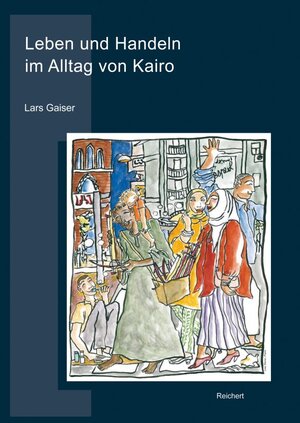
“The thesis of Mr. Gaiser allows [...] a deep insight into the actions of an urban society in the Arab world. Using his newly developed epistemological concept, he succeeds in an excellent way to document the lives and practices in this society not only [scientifically] accurate but also vivid and thus very understandable.”
Prof. Dr. Horst Kopp, Arab Geographer and supervisor of Dr. Gaiser’s theses
“The factually logical structured methodology design helped him to penetrate [...] deeply into the theme. His implementation in three steps – records of everyday life actions (case studies), categorisation and analysis – is a pleasure. He deliberates the results of the singular arbitrariness and protects them from an over-exaggerated subjectivism. He created a complex but nonetheless clear picture comprising many individual insights into people's lives.”
Prof. Dr. Rainer Uphues, Chair of Didactics of Geography, University of Erlangen-Nuremberg
“Dr. Gaiser draws his knowledge from his extraordinary in situ knowledge built up over many years, his erudition (his multilingual skills allow him to read books written by authors from different cultural backgrounds) and from his well-founded multi-disciplinary studies in Germany and Egypt.”
Prof. Dr. Muhammad Abu Hattab, founding dean of the Alsun Faculty in Al-Minya University (Upper Egypt)
„Unter dem Eindruck des politisch-gesellschaftlichen Diskurses infolge des 11. Septembers 2001 und der Orientalismusvorwürfe von Seiten arabischer Intellektueller hat Lars Gaiser einen neuen handlungszentrierten Forschungsansatz entwickelt, den er am Beispiel der vier Alltagssituationen Bildung ermöglichen - Nachbarschaft gewähren - Wohnraum beschaffen sowie Wohnraum gewähren getestet hat. Durch die Analyse sämtlicher mit diesen Alltagssituationen verbundenen Handlungsoptionen und unter Verwendung zahlreicher Fallbeispiele verschafft er dem Leser einen Einblick in die disparaten gesellschaftlichen Verhältnisse in Kairo unmittelbar vor den Massenaufständen.“
In: Fachbuchkritik. de
http://www. fachbuchkritik. de/html/leben_und_handeln_im_alltag_vo. html
(19. März 2012)
--------------------------------------
„Die Dissertation von Herrn Gaiser ermöglicht […] tiefe Einblicke in das Handeln einer ausgewählten städtischen Gesellschaft der arabischen Welt. Mit Hilfe [s]einer neu entwickelten erkenntnistheoretischen Konzeption gelingt es ihm ausgezeichnet, das Leben und Handeln in dieser Gesellschaft nicht nur genau zu dokumentieren, sondern eben auch begreifbar und damit verstehbar zu machen.“
Prof. Dr. Horst Kopp, Orientgeograph und Betreuer der Arbeit
„Die […] tiefe inhaltliche Durchdringung der Thematik wird noch unterstützt durch ein sachlogisch strukturiertes methodisches Vorgehen. Der Dreischritt von Alltagsaufnahme (Fallbeispiel), Kategorisierung und Analyse gefällt im Besonderen. Er befreit die Ergebnisse aus dem Singulären und schützt sie vor einem überbordenden Subjektivismus. Es entsteht aus vielen Einzelschicksalen ein gleichermaßen vielfältiges wie klares Bild.“
Prof. Dr. Rainer Uphues, Lehrstuhl für Didaktik der Geographie, Universität Erlangen-Nürnberg
„Herr Dr. Gaiser schöpft sein Wissen aus seinen außergewöhnlichen über viele Jahre aufgebauten Vorortkenntnissen, aus seiner Belesenheit (dank seiner Mehrsprachigkeit griff er zu Büchern von Autoren verschiedener kultureller Herkunft) und aus einer fundierten multidisziplinären Ausbildung in Deutschland und Ägypten.“
Prof. Dr. Muhammad Abu Hattab, Gründungsdekan der Alsun-Fakultät in al-Minya (Oberägypten)






